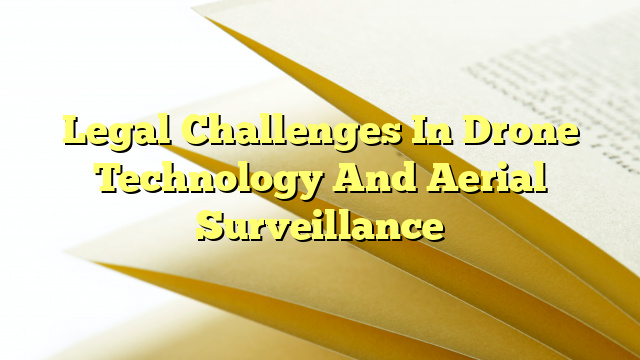Drones, also known as unmanned aerial vehicles (UAVs), are increasingly being used in a variety of roles, including military, civilian, and commercial applications. While drones can provide cost savings and efficiency in many cases, their use also raises numerous legal issues. This article will discuss the various legal challenges associated with drones, including the use of drones for surveillance, the sale and operation of drones, and the implications of using drones for law enforcement and security services.
Table of Contents
- Legal Implications with Drones
- Limitations of Drone Technology in Security Services
- Problem with Drone Technology in Security Services
- Law Enforcement Use of Drones for Surveillance
- Surveillance Drones for Sale
Legal Implications with Drones
The use of drones has been the source of much debate due to the potential privacy and safety implications associated with their use. In the United States, the Federal Aviation Administration (FAA) has regulations in place that regulate the operation of drones, including rules regarding their operation in certain areas and the requirement of a pilot’s license for commercial use. The FAA also requires operators to keep their drones within line of sight at all times, and also prohibits the operation of drones over people or property without the expressed consent of the owner.
In addition to the FAA regulations, a number of states have also enacted laws regarding the use of drones. These laws vary from state to state, but generally seek to protect the privacy of citizens by restricting the use of drones for surveillance purposes, such as photographing private property or individuals without their permission.
The legal implications associated with the use of drones are not limited to the United States. Other countries have also enacted laws restricting the use of drones for various purposes. In the United Kingdom, for example, the Civil Aviation Authority (CAA) has regulations in place that prohibit the operation of drones in certain areas, restrict the altitude at which drones may be flown, and require operators to obtain permission before flying their drones.
Limitations of Drone Technology in Security Services
The use of drones for security and law enforcement purposes has certain limitations due to the fact that they are unmanned aerial vehicles. For example, drones are limited in their ability to detect and track targets due to their limited range and field of view. Furthermore, drones are only able to operate in daylight hours, and their operation may be limited due to weather conditions, such as fog or heavy winds.
In addition, the control of drones is limited by legal restrictions imposed by the FAA and other organizations. These restrictions include the requirement of a pilot’s license for commercial use, as well as restrictions on operating drones in certain areas or over people or property without permission. These restrictions may limit the effectiveness of drone technology for security and law enforcement purposes.
Problem with Drone Technology in Security Services
One of the primary problems associated with the use of drones for security and law enforcement purposes is the potential for misuse. Drones have the potential to be used for illegal surveillance, as well as for other unlawful activities such as smuggling and piracy. Furthermore, drones may be used to violate privacy rights or interfere with the operation of aircraft.
The use of drones for security and law enforcement purposes also raises concerns regarding the potential for abuse of power. The use of drones for surveillance and other purposes may be used as a tool for oppressive governments or individuals to monitor and control citizens. Furthermore, the use of drones for security and law enforcement purposes may be used to limit civil liberties, such as freedom of speech and assembly.
Law Enforcement Use of Drones for Surveillance
The use of drones for law enforcement and security purposes is an area of growing concern. While drones can provide a cost-effective and efficient way of monitoring an area, the use of drones for surveillance purposes may raise significant legal issues. In the United States, the use of drones for law enforcement purposes


With drones, legal issues around privacy and aerial surveillance abound. It’s an area that must be navigated carefully.
Legal challenges abound in drone technology.